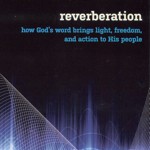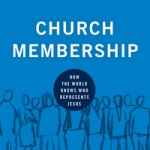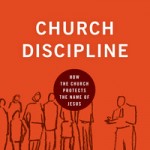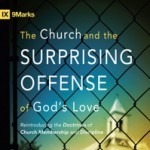 I try to let most of my reading focus on works from the pens of men who’ve long lay in the ashes.
I try to let most of my reading focus on works from the pens of men who’ve long lay in the ashes.
But every so often a contemporary author comes along and has a kind of winsome wisdom that demands attention. One man who falls squarely into that category is Jonathan Leeman.
Do you know him?
Leeman currently serves as the editorial director for 9Marks and is a lay elder at Capitol Hill Baptist Church. He wields his authorial pen with witty profundity and accessibility. That latter trait is most important seeing that Leeman rarely leaves – at least in his publications – the theological space of “church polity.”
Have you ever read a work on church polity? If you actually did, that odds are that two things were true: 1) it was old, and 2) it tested your ability to stay interested. And that’s why you must read good Dr. Leeman; he is a modern author who is abundantly useful and insightful. I don’t think it’s any stretch to say that Leeman – in conjunction with his comrades at 9Marks – might just make polity popular again.
Here are four books from Leeman, with the publisher’s description, that every pastor should consider. And I’d read ’em in the following order.
LEARNING FROM LEEMAN
 Reverberation: How God’s Word Brings Light, Freedom, and Action to His People. What is the most effective way to grow a church? It’s not a new methodology or cultural outreach strategy, it’s…the Word of God. In this book, Jonathan Leeman wants you to realize that the Word, working through God’s Spirit, is responsible for the growth of God’s church and we need to trust it! Leeman not only informs and equips the leadership of local churches for greatest effectiveness in their preaching ministry but explains how to translate that into the life of the church throughout the week. The book also deals with two errors – not trusting the Word (resulting in a pragmatic ministry philosophy) and not living in light of the Word, (resulting in a ministry philosophy of “preaching is enough”).
Reverberation: How God’s Word Brings Light, Freedom, and Action to His People. What is the most effective way to grow a church? It’s not a new methodology or cultural outreach strategy, it’s…the Word of God. In this book, Jonathan Leeman wants you to realize that the Word, working through God’s Spirit, is responsible for the growth of God’s church and we need to trust it! Leeman not only informs and equips the leadership of local churches for greatest effectiveness in their preaching ministry but explains how to translate that into the life of the church throughout the week. The book also deals with two errors – not trusting the Word (resulting in a pragmatic ministry philosophy) and not living in light of the Word, (resulting in a ministry philosophy of “preaching is enough”).
Reverberation explains the pulpit ministry and traces the theme of how the Word continues through the life of the church. Both theological and practical, Reverberation focuses on how the church hears, responds, discusses, implements and is transformed by the Word. No high-octane production, superstar personalities, or postmodern entreaties, just stuff that is really old, really good, and really powerful!
 Church Membership: How the World Knows Who Represents Jesus. Why should you join a church? Becoming a member of a church is an important, and often neglected, part of the Christian life. Yet the trend these days is one of shunning the practice of organized religion and showing a distaste or fear of commitment, especially of institutions. Jonathan Leeman addresses these issues with a straightforward explanation of what church membership is and why it’s important. Giving the local church its proper due, Leeman has built a compelling case for committing to the local body.
Church Membership: How the World Knows Who Represents Jesus. Why should you join a church? Becoming a member of a church is an important, and often neglected, part of the Christian life. Yet the trend these days is one of shunning the practice of organized religion and showing a distaste or fear of commitment, especially of institutions. Jonathan Leeman addresses these issues with a straightforward explanation of what church membership is and why it’s important. Giving the local church its proper due, Leeman has built a compelling case for committing to the local body.
 Church Discipline: How the Church Protects the Name of Jesus. Church discipline is essential to building a healthy church. So how exactly do we practice church discipline? Jonathan Leeman helps us face the endless variety of circumstances and sins for which no scriptural case study exists, sins that don’t show up on any list and need a biblical framework to be corrected appropriately in love. Here is a contemporary and concise how-to guide that provides a theological framework for understanding and implementing disciplinary measures in the local church, along with several examples of real-life situations and the corresponding responses.
Church Discipline: How the Church Protects the Name of Jesus. Church discipline is essential to building a healthy church. So how exactly do we practice church discipline? Jonathan Leeman helps us face the endless variety of circumstances and sins for which no scriptural case study exists, sins that don’t show up on any list and need a biblical framework to be corrected appropriately in love. Here is a contemporary and concise how-to guide that provides a theological framework for understanding and implementing disciplinary measures in the local church, along with several examples of real-life situations and the corresponding responses.
 The Church and the Surprising Offense of God’s Love: Reintroducing the Doctrines of Church Membership and Discipline. When the world speaks of “love,” it often means unconditional acceptance. Many churches have adopted this mind-set in their practice of membership and discipline—if they have not done away with such structures entirely. “Yet God’s love and God’s gospel are different than what the world expects,” writes Jonathan Leeman. They’re centered in his character, which draws a clear boundary between what is holy and what is not. It’s this line that the local church should represent in its member practices, because the careful exercise of such authority “is God’s means for guarding the gospel, marking off a people, and thereby defining his love for the world.”
The Church and the Surprising Offense of God’s Love: Reintroducing the Doctrines of Church Membership and Discipline. When the world speaks of “love,” it often means unconditional acceptance. Many churches have adopted this mind-set in their practice of membership and discipline—if they have not done away with such structures entirely. “Yet God’s love and God’s gospel are different than what the world expects,” writes Jonathan Leeman. They’re centered in his character, which draws a clear boundary between what is holy and what is not. It’s this line that the local church should represent in its member practices, because the careful exercise of such authority “is God’s means for guarding the gospel, marking off a people, and thereby defining his love for the world.”
So how should churches receive and dismiss members? How should Christians view their submission to the church? Are there dangers in such submission? The Church and the Surprising Offense of God’s Love responds with biblical, theological, and practical guidance-from both corporate and individual perspectives. It’s a resource that will help pastors and their congregations upend worldly conceptions and recover a biblical understanding and practice of church authority.
